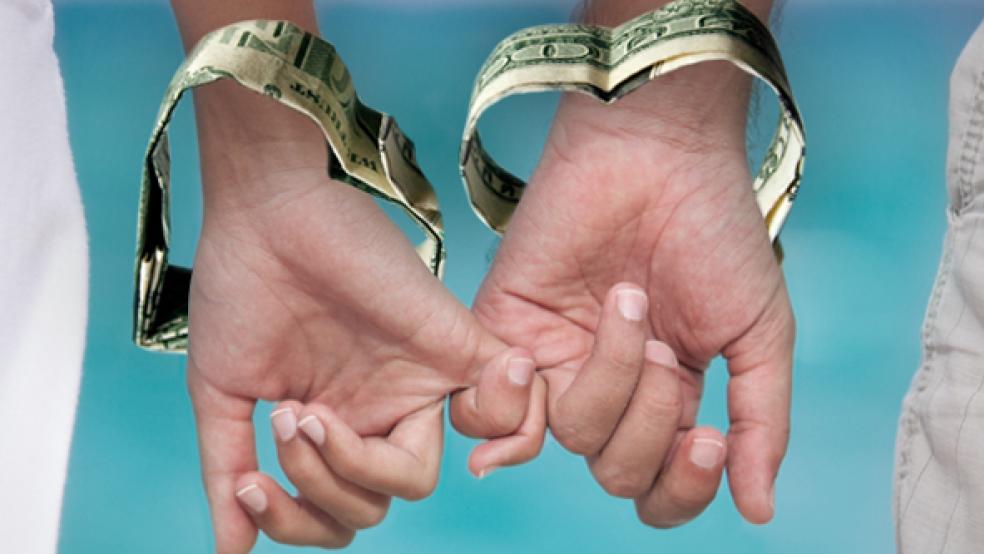Some wealthy and low-income married couples are losing out at tax time, but experts say eliminating the so-called marriage penalty is more complicated than you might think.
"It's just impossible to get rid of it with the tax system that we've got," said Roberton Williams, senior fellow at the Tax Policy Center think tank.
That's because the U.S. tax system is progressive, meaning that people pay more taxes as their incomes go up, and also factors in whether people are married or single when it comes to filing taxes.
Related: 10 Surprising Taxes You May Have to Pay
Williams suspects that more couples get a marriage bonus than a marriage penalty, meaning that their overall tax bill is lower because they are married. But he said there's no question that some people would have a lower tax bill if they were single instead of married. And despite an effort in the early 2000s to decrease the group of people subject to the marriage penalty, some couples are still caught by it.
At this point, researchers say those are mainly high-income couples with similar earnings who are bumped into higher tax brackets because of their joint earnings, or lower-income couples who lose out on tax benefits and other social assistance once they combine incomes.
'Classic Liberal/Conservative Compromise'
The current state of the marriage penalty is, like so much of the tax code, the result of years of back-and-forth wrangling over who should pay how much in taxes, and why.
In the early days of the tax code, everyone filed their taxes separately so no one got a benefit or penalty from being married. Then, in certain states that allowed for community property, the few couples who had to pay taxes at that time were able to split their incomes, creating a marriage bonus.
By the late 1940s, Congress created the option of filing a joint return, which allowed many couples to enjoy a marriage bonus.
Related: The 10 Worst States for Taxes
Williams said that led to complaints from war widows who said that they were suffering from a tax penalty because they didn't have a spouse. Since then, lawmakers have spent decades tinkering with the tax code to try to find compromises for married, singled, divorced and widowed taxpayers. Many believe it's unlikely that the marriage penalty will go away completely.
"This has been a classic liberal/conservative compromise," said Eugene Steuerle, a senior fellow at the Urban Institute who has written extensively about tax policy.
Steuerle said he's found that left-leaning politicians like the progressive element of the system, which means that people who make more money have a higher tax rate, while conservatives like the fact that certain tax breaks and benefit programs phase out as incomes go up, saving the government money.
"The people who want to get rid of the marriage tax penalty tend to be the progressive people, and they don't want to get rid of the progressive tax system," said Pat Cain, a professor of tax law at Santa Clara University in California.
'More to Marriage Than Dollars and Cents'
Williams said there's no evidence that the marriage penalty affects people's decision to get married, although it might affect the timing. For example, a couple may wait a year or two to get married so they have a little more time without the penalty, or wed in January instead of December to avoid one year of paying it.
But he said most people seem to eventually get married if they were planning to. "It's certainly the case that there's more to marriage than just dollars and cents," he said.
Related: How Obamacare Could Affect Your Taxes This Year
Steuerle said he also hasn't seen any data to suggest that taxes or other government policies are driving broader societal changes, such as the increase in out-of-wedlock births and the decline in marriage rates. Still, he said, "It's not clear that it's a great idea to reinforce that with the tax and welfare system."
Some same-sex spouses will be getting a bonus or paying penalty for the first time this year, because this is the first tax season that the Internal Revenue Service is recognizing those unions. Cain said tax implications are not keeping same-sex couples she knows from getting married in states where it is legal.
"Most of the people I know say it's the price of equality," she said. "We get to get discriminated against in the tax system just like opposite sex couples."
This article originally appeared at CNBC.
Read more at CNBC:
Most common tax surprises for same-sex couples
Here's what Americans really do with tax refunds
Cheat on taxes? Never!




